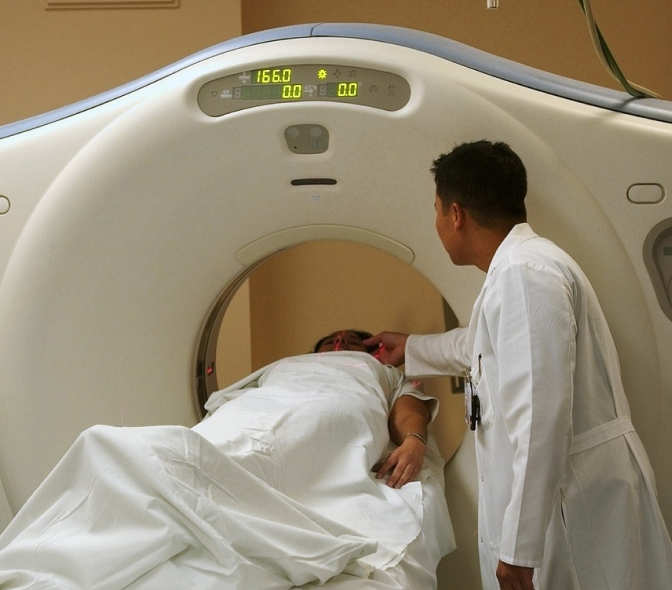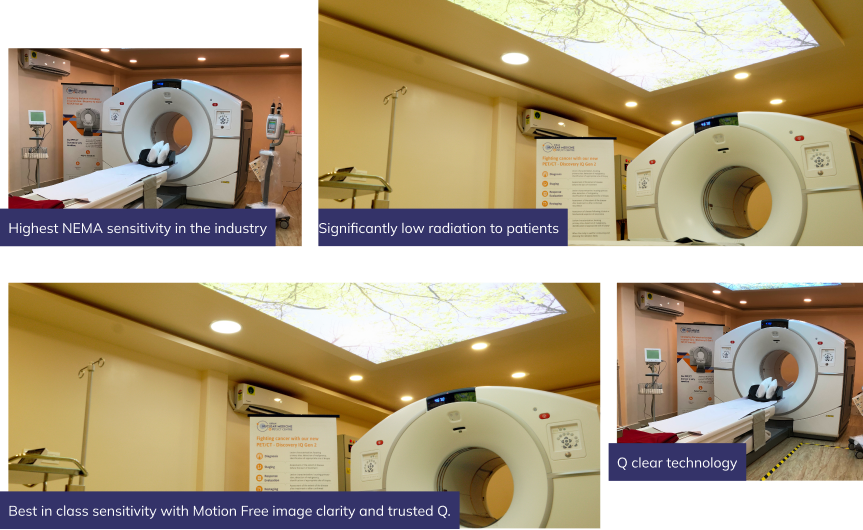Lutetium-177 FAPI Therapy
Home » Lutetium-177 FAPI Therapy
- Experience a whole new world of medicine - Theranostics - at the state of the art facility
- Combine your therapy with imaging for personalized, targeted treatment
- Clean, comfortable and premium isolation rooms which are regularly sanitized.
- Pioneers of theranostics in India

What is Lutetium FAPI Therapy?
Who Might Benefit?
- Advanced or Inoperable Cancers: When surgery is not an option, or the cancer has spread beyond the initial site (metastatic).
- FAP-Positive Tumors: As identified by a prior FAPI PET scan using a different isotope.
- Relapsed or Refractory Cancers: For cancers that have returned or not responded well to other treatments.
How it Works?
- FAPI Targeting: FAPI (fin protein inhibitor) is a molecule that binds to fibroblast activation protein ( FAP ). FAP is a protein often expressed in high levels on the surface of various cancer cells and the surrounding tumor stroma (suppobroblast activatiortive tissue).
- Lu 177 Attachment: Lu-177, a radioactive isotope known for emitting effective beta radiation, is linked to FAPI, creating Lu-177 FAPI.
- Dual Action: Lu-177 FAPI acts as a theranostic agent.
- PET CT Imaging:Simultaneously, the PET CT component provides high resolution anatomical images of the same area.
- Diagnosis: An initial injection of FAPI labeled with a different isotope (often Gallium-68) can be used to identify FAP-positive tumors through PET imaging.
- Treatment: A subsequent injection of Lu-177 FAPI delivers targeted radiation directly to FAP-positive cancer cells, while minimizing damage to healthy tissues.

The Next Generation Technology is Here at Kiran PET CT - GE-DISCOVERY IQ GEN 2

Why Choose Us

Pioneering Theranostics
At Kiran Nuclear Medicine and PET CT Center, we're leading the way in theranostics, integrating advanced diagnostics with personalized treatment plans.

Precision and Effectiveness
Our commitment to theranostics means that you receive precise diagnoses and targeted therapies, leading to more effective treatment outcomes. We leverage cutting-edge technology and expertise to deliver the highest standard of care.

Personalized Medicine
We prioritize your individual health needs, providing customized treatment plans that consider your medical history, preferences, and treatment goals.
Meet Our Doctors
Frequently asked questions
Lutetium-177 FAPI Therapy is a novel targeted radionuclide therapy used in the treatment of various solid tumors, particularly those that overexpress fibroblast activation protein (FAP). It involves the administration of a radioactive isotope, Lutetium-177, coupled with a FAP-targeting ligand. This combination allows for the selective delivery of radiation to FAP-expressing tumor cells.
Fibroblast activation protein (FAP) is a cell surface protein that is overexpressed in the stroma of many solid tumors, including pancreatic, colorectal, and lung cancers. Lutetium-177 FAPI Therapy utilizes a ligand that specifically binds to FAP. When coupled with Lutetium-177, a beta-emitting radionuclide, this ligand delivers radiation directly to the FAP-expressing tumor cells, leading to their destruction.
Lutetium-177 FAPI Therapy may be considered for patients with advanced or metastatic solid tumors that express high levels of FAP. It is typically recommended for patients who have exhausted standard treatment options or who are not candidates for surgery, chemotherapy, or other therapies.
Lutetium-177 FAPI Therapy is generally considered safe when administered by trained healthcare professionals in specialized nuclear medicine facilities. However, like any medical treatment, there are potential side effects and risks associated with the therapy, including bone marrow suppression, kidney damage, and radiation exposure to other tissues. Patie
Before undergoing Lutetium-177 FAPI Therapy, patients may undergo imaging studies such as PET/CT scans with FAPI tracers to assess the extent of disease and FAP expression. The therapy itself involves the intravenous administration of Lutetium-177 FAPI, typically as a series of treatments spaced several weeks apart. Patients may experience side effects such as fatigue, nausea, and decreased blood cell counts, which are usually temporary and manageable
Lutetium-177 FAPI Therapy is a relatively new treatment approach, and clinical data regarding its efficacy are still emerging. Preliminary studies have shown promising results, with some patients experiencing tumor shrinkage, symptom relief, and improved quality of life. However, more research is needed to fully understand the potential benefits and limitations of this therapy. Patients interested in Lutetium-177 FAPI Therapy should discuss this treatment option with their healthcare provider to determine its suitability for their individual circumstances.




